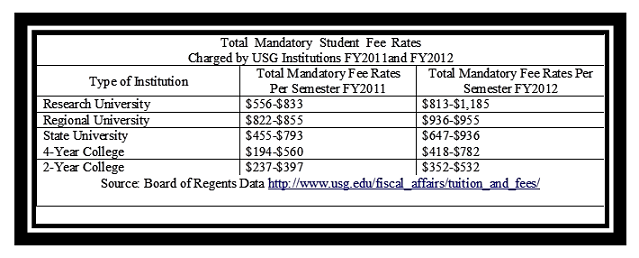Article Posted July 13, 2012

Mandatory Student Fees
Mandatory student fees are required to be paid by all students, and must be approved annually. These fees are subject to Board of Regents (BOR) Policy Manual § 7.3.2.1 , which describes how fees are approved, including the requirements for student participation in the process. Mandatory student fees include, but are not limited to:
- intercollegiate athletic fees,
- student health service fees,
- transportation fees,
- parking fees (if charged to all students),
- student activity fees,
- technology fees, and
- facility fees.
Institutions are encouraged to involve students throughout the fee proposal process in addition to the required review by a student fee committee. It is important to communicate the added value of the services for which the fee will provide to the students who will use the service or fund the rental of a new building. In addition, including students in the process allows the Board of Regents to know that a level of students support exists when approving an application that increases or proposes new student fees.
Below is a table that summarizes the total mandatory fees per semester for fiscal years 2011 and 2012:

Approval Process:
•Institutions must submit a fee request proposal to the Office of Fiscal Affairs in December. The proposal must include:
- Summary of fee requests
- Detailed revenue project for each mandatory fee request
- Financial data form with actual and projected revenues and expenditures, and
- Mandatory student fee participation form.
• Fiscal Affairs reviews the fee requests submitted by each institution. After review, the Office of Fiscal Affairs makes recommendations to the Chancellor and the Board of Regents.
• All mandatory student fees and fee increases must be approved by the BOR at its April meeting to become effective the following fall semester.
Criteria:
- Mandatory student fees may be waived for students who are enrolled for fewer than six credit hours. Alternatively, mandatory fees may be prorated on a per-credit-hour basis for students taking fewer than twelve credit hours. Mandatory fees may be reduced for students enrolled in summer courses.
- Student participation in the fee approval process is required; specifically, the fee advisory board must be composed of at least 50% students and include at least four students. Students are appointed to the committee by the institution’s student government association. Institutions and student government associations should make a concerted effort to include broad representation among the students appointed to the committee.
- The purpose of the committee is to provide advice and counsel to the institution president. The BOR, however, does not require approval of the request by the committee.
- Mandatory student fees are to be used exclusively to support the institution’s mission to enrich the educational, institutional, and cultural experience of students.
- All payments from funds supported by student mandatory fees must be made using approved and appropriate business practices of the institution.
The BOR approves mandatory fees at the April BOR Board Meeting. Therefore, the institution must plan accordingly to allow adequate time for full consideration of the fees at the institution level. By example, below is a Case Study outlining a process used by a USG institution to increase student awareness and develop support for a proposed mandatory “recreation and wellness” student fee to build a new facility?
The Process
- Exploratory committee consisting of students, faculty, and staff formed to determine need for and purpose of proposed fee
- Committee met multiple times, and included significant student participation, from the affected campuses
- Study determined on institution lacked appropriate wellness and recreation facilities as compared to similarly sized and operated USG institutions
- Findings were shared with students throughout the process in a series of 11 different presentations over a three-month period
- Additionally, a Web site was created to provide information to students regarding the fee proposal, and to purposefully seek out student input
o Over 1,000 students participated in the presentations and related surveys
- Proposed fee of $140 per semester determined to develop an appropriately $1.7m annual revenue stream to provide for new recreation and wellness facility
- For students who pay the fee and graduate before the facility opens, they will be provided free access for the same number of semesters the fee was paid prior to graduation.
Posted by Ted Beck
Published in: Policy Briefs
Most Recent in: Policy Briefs

COSO Internal Control Integrated Framework - 17 Principles
Posted by Randy Pearman
March 27, 2013

Extra Compensation Related to Federal Grants
Posted by OIAC
March 26, 2013

When Is the Auditor Audited?
Posted by Michael J. Foxman
March 26, 2013

Internal Control Issues Concerning Grant Awards
Posted by OIAC
October 25, 2012

COSO Internal Control Integrated Framework Proposed Updates
Posted by OIAC
October 25, 2012
View Articles by Category
Search
Contact
Internal Audit & Compliance
Board of Regents of the University System of Georgia
270 Washington Street, SW
Atlanta, GA 30334
Tel.: 404-962-3020
Fax: 404-962-3033
Email: .(JavaScript must be enabled to view this email address)

